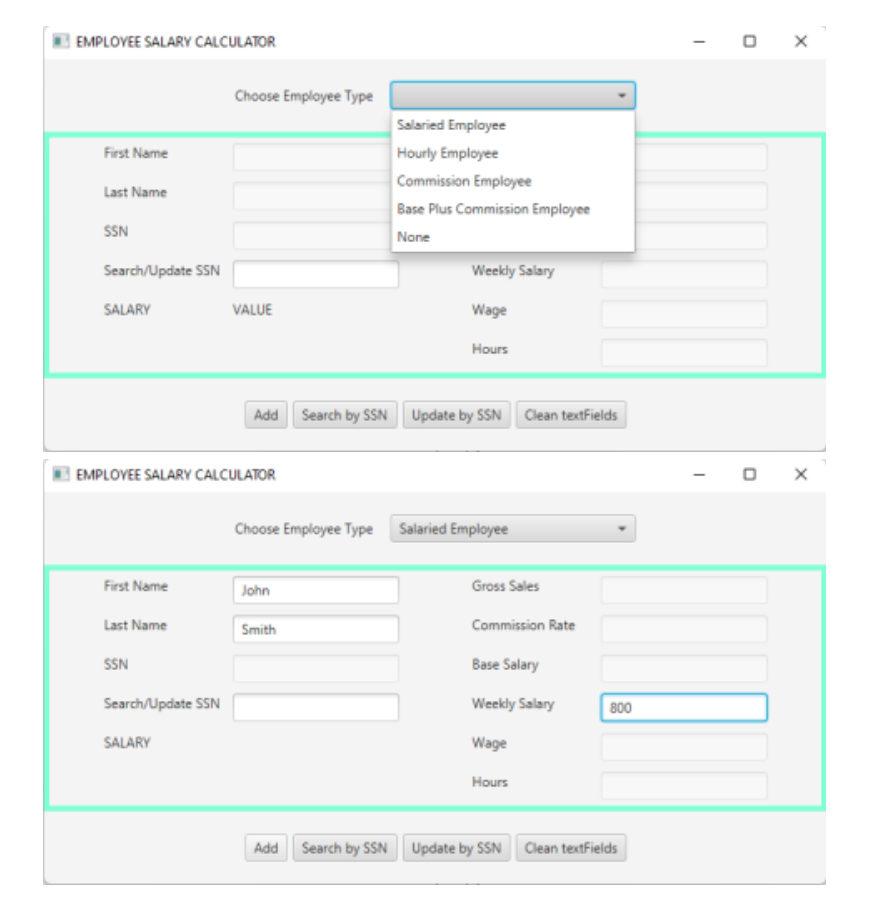Question
Full solution needed. I have a code in Java, but I can't convert it into the JavaFX. I have some problems about the GUI. The
Full solution needed. I have a code in Java, but I can't convert it into the JavaFX. I have some problems about the GUI. The expected output and my codes are attached below. Can you please create a GUI and combine your GUI / UI with my Java code?
Code has 8 classes named PayableInterfaceTest, CommisionEmployee, BasePlusCommisionEmployee, HourlyEmployee, Employee, Invoice, Payable, SalariedEmployee. I have all these classes as designed, but the problem is I can not be able to adapt this code to JavaFX. I tried as far as I could go, but I only got a white screen, which means there's no user interface. Expected output is attached right after the code.
CODE
public class PayableInterfaceTest{
public static void main(String[] args) {
Payable[] payableObjects = new Payable[6];
payableObjects[0] = new Invoice("01234", "seat", 2, 375.00); payableObjects[1] = new Invoice("56789", "tire", 4, 79.95); payableObjects[2] = new SalariedEmployee("John", "Smith", "111-11-1111", 800.00); payableObjects[3] = new HourlyEmployee("Bob", "Marley", "222-22-2222", 33.00, 40); payableObjects[4] = new CommissionEmployee("Jessica", "Johnson", "333-33-3333", 1350, 0.85); payableObjects[5] = new BasePlusCommissionEmployee("Jenny", "James", "666-66-6666", 1175, 0.95, 660.00);
System.out.println( "Invoices and Employees processed polymorphically: ");
for(Payable currentPayable : payableObjects){ System.out.printf("%s %s: $%,.2f ", currentPayable.toString(), "Payment due", currentPayable.getPaymentAmount()); }
for (Payable currentPayable : payableObjects){ if(currentPayable instanceof BasePlusCommissionEmployee){ BasePlusCommissionEmployee employee = (BasePlusCommissionEmployee)currentPayable; double employeePay = employee.getBaseSalary(); double newSalary = employeePay + (employeePay * .10); employee.setBaseSalary(newSalary);
System.out.printf("The base pay of " + employee.getFirstName() + " " + employee.getLastName() + " with a 10%% raise is %.2f ", newSalary); }
} } }
public class CommissionEmployee extends Employee { private double grossSales; private double commissionRate;
public CommissionEmployee(String first, String last, String ssn, double sales, double rate){ super(first, last, ssn); setGrossSales(sales); setCommissionRate(rate); }
public void setCommissionRate(double rate){ if(rate > 0.0 && rate 0.0 and
public double getCommissionRate(){ return commissionRate; }
public void setGrossSales(double sales){ if(sales >= 0.0){ grossSales = sales; }else{ throw new IllegalArgumentException("Gross sales must be >= 0.0"); } }
public double getGrossSales(){ return grossSales; }
@Override public double getPaymentAmount(){ return getCommissionRate() * getGrossSales(); }
@Override public String toString(){ return String.format("%s: %s %s: $%,.2f; %s: %.2f", "commission employee", super.toString(), "gross sales", getGrossSales(), "commission rate", getCommissionRate()); }
}
public class BasePlusCommissionEmployee extends CommissionEmployee { private double baseSalary; public BasePlusCommissionEmployee(String first, String last, String ssn, double sales, double rate, double salary){ super(first, last, ssn, sales, rate); setBaseSalary(salary); }
public void setBaseSalary(double salary){ if(salary >= 0.0){ baseSalary = salary; }else{ throw new IllegalArgumentException( "Base salary must be >= 0.0"); } }
public double getBaseSalary(){ return baseSalary; }
@Override public double getPaymentAmount(){ return getBaseSalary() + super.getPaymentAmount(); }
@Override public String toString(){ return String.format("%s %s; %s: $%,.2f", "Base-salaried", super.toString(), "Base salary", getBaseSalary()); } }
public abstract class Employee implements Payable { private final String firstName; private final String lastName; private final String socialSecurityNumber; public Employee(String first, String last, String ssn){ firstName = first; lastName = last; socialSecurityNumber = ssn; }
public String getFirstName(){ return firstName; }
public String getLastName(){ return lastName; }
public String getSocialSecurityNumber(){ return socialSecurityNumber; }
@Override public String toString(){ return String.format("%s %s %s: %s", getFirstName(), getLastName(), "social security number", getSocialSecurityNumber()); }
@Override public abstract double getPaymentAmount();
}
public class HourlyEmployee extends Employee { private double wage; private double hours; public HourlyEmployee(String first, String last, String ssn, double hourlyWage, double hoursWorked){ super(first, last, ssn); setWage(hourlyWage); setHours(hoursWorked); }
private void setHours(double hoursWorked) { // TODO Auto-generated method stub }
public void setWage(double hourlyWage){ if(hourlyWage >= 0.0){ wage = hourlyWage; }else{ throw new IllegalArgumentException( "Hourly wage must be >= 0.0"); } }
public double getWage(){ return wage; }
@Override public double getPaymentAmount() { // TODO Auto-generated method stub return 0; } }
public class Invoice implements Payable { private final String partNumber; private final String partDescription; private int quantity; private double pricePerItem;
public Invoice(String part, String description, int count, double price){ partNumber = part; partDescription = description; setQuantity(count); setPricePerItem(price); }
public void setQuantity(int count){ if(count >= 0){ quantity = count; }else{ throw new IllegalArgumentException("Quantity must be >= 0"); } }
public int getQuantity(){ return quantity; }
public void setPricePerItem(double price){ if(price >= 0.0){ pricePerItem = price; }else{ throw new IllegalArgumentException( "Price per item must be >= 0"); } }
public double getPricePerItem(){ return pricePerItem; }
@Override public String toString(){ return String.format("%s: %n%s: %s (%s) %n%s: %d %n%s: $%,.2f", "invoice", "part number", getPartNumber(), getPartDescription(), "quantity", getQuantity(), "price per item", getPricePerItem()); }
public String getPartNumber(){ return partNumber; }
public String getPartDescription(){ return partDescription; }
@Override public double getPaymentAmount(){ return getQuantity() * getPricePerItem(); }
}
public interface Payable { double getPaymentAmount(); }
public class SalariedEmployee extends Employee { private double weeklySalary; public SalariedEmployee(String first, String last, String ssn, double salary){ super(first, last, ssn); setWeeklySalary(salary); }
public void setWeeklySalary(double salary){ if(salary >= 0.0){ weeklySalary = salary; }else{ throw new IllegalArgumentException( "Weekly salary must be >= 0.0"); } }
public double getWeeklySalary(){ return weeklySalary; }
@Override public double getPaymentAmount(){ return getWeeklySalary(); }
@Override public String toString(){ return String.format("salaried employee: %s %s: $%,.2f", super.toString(), "weekly salary", getWeeklySalary()); }
}
EXPECTED OUTPUT

Step by Step Solution
There are 3 Steps involved in it
Step: 1

Get Instant Access to Expert-Tailored Solutions
See step-by-step solutions with expert insights and AI powered tools for academic success
Step: 2

Step: 3

Ace Your Homework with AI
Get the answers you need in no time with our AI-driven, step-by-step assistance
Get Started


